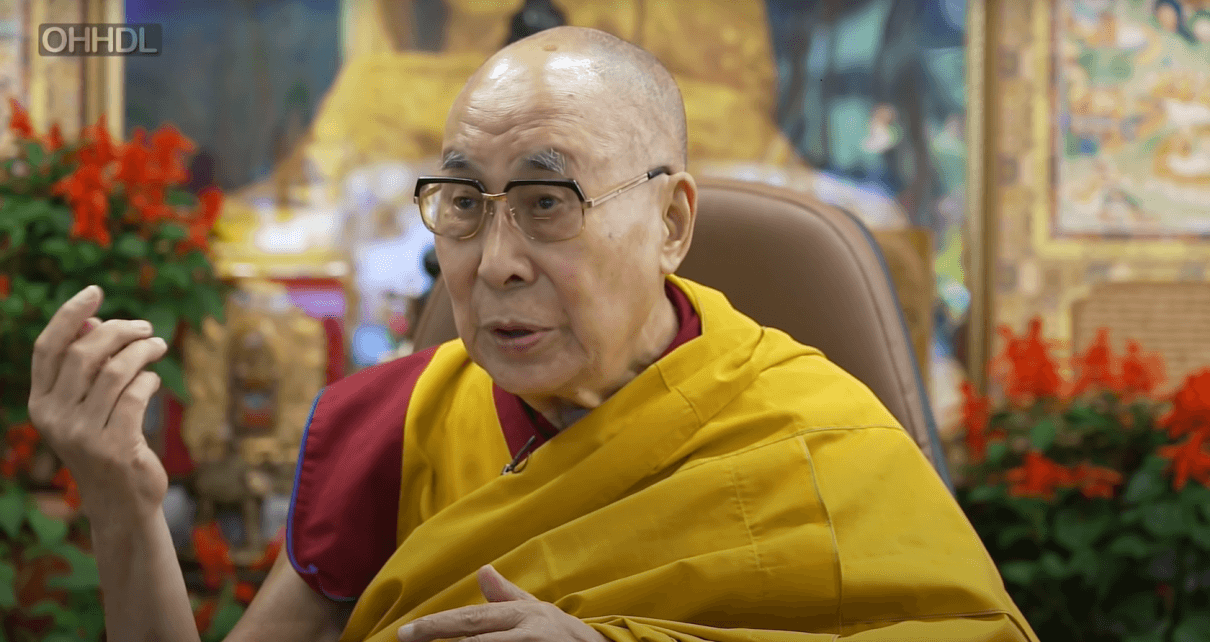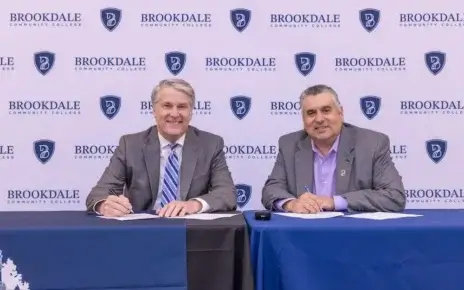The XIV Dalai Lama joined the Monmouth University community through an interactive livestream to discuss happiness, health, well-being, and the future on Tuesday, Sept. 21.
Students, staff, and faculty were given the opportunity to submit questions for His Holiness to answer, 13 of which were selected to be addressed during the event.
President Patrick Leahy, Ed.D., began the livestream by welcoming the Dalai Lama to the Monmouth University community. “We at Monmouth have been eagerly anticipating this conversation for several months. We have planned and carried out a series of reflective events leading up to this opportunity for our community to engage directly with His Holiness. We will continue to celebrate and honor His ideals with educational programming and events throughout the fall semester,” said Leahy. “We are deeply honored by your presence, enriched by your words, and inspired to lead happier, healthier, and more compassionate and harmonious lives for the benefit of generations to come.”
“Yet, in the past, we hu-man beings have become the most trouble-makers,” explained His Holiness. He went on to describe how our reliance on weapons has caused us to stray from peace and lead to a depen-dence on violence, expressing a desire to reduce our reliance on violent defenses and eventually stop their production altogether.
Instead, he advised that we devote more attention to inner peace and compassion, explaining that we naturally have a constant sense of community and there’s no purpose for weapons when the world is your community. We’re all the same and have to live side by side to develop a peaceful and happy world, which starts with putting on a happy face that will then inspire others to do the same.
“We have to pay more at-tention to inner peace. The real peace and happiness is within our own mind,” explained His Holiness. He believes that not only medicine has kept him healthy, but also his mentality regarding inner peace. Con-stant anger and fear are bad for our health and should be avoided.
“It’s important to investigate what destroys your peace of mind. Anger, fear, all of these lead to a self-centered attitude. A more compassionate mind is very helpful, and so is sleep,” he explained.
Following this opening discussion, the Dalai Lama then responded to pre-selected questions from members of the Monmouth University community. This portion of the livestream was moderated by Joanne Jodry, Ed.D., D.M.H., Assistant Professor of Professional Counseling.
“We are very humbled and grateful for your wisdom that you’re going to share with our Monmouth University community tonight,” said Jodry.
The first question came from student Jacob Cordero, who asked about the future of climate change and what we should be doing to address it.
The Dalai Lama explained his belief that these global changes are simply a process of nature. “Already, we notice that some areas across the world are too hot. Ice at the poles is rapidly melting because of climate change. These are beyond our control,” said His Holiness. “Over the next few decades, we need to take care of our changing planet.”
When Raj Devasagayam, Ph.D., Dean of Leon Hesse Business School, asked about the effects of the COVID-19 pandemic on our spiritual lives, His Holiness had a similar response in which he explained that we cannot worry about the things we can’t control.
A later question came from student Peter Quinton, who asked “Since Buddhist practices and philosophy were developed within the context of a collectivist Eastern culture, what are some challenges and how may these be remedied for people who come from an individual centered Western culture integrating Buddhist philosophy and practices into their lives?”
“Buddhism offers emphasis on the importance of individual peace of mind and happiness. It does not mean ignoring individual interest. You should improve yourself to then share with others,” responded the Dalai Lama. “We cannot distinguish between Westerner and Easterner. We are the same. There are some differences in ways of life, but they are minor.”
Student Mercy Yayre Dufe posed a question about finding inner peace while dealing with the fears of human conditions and embracing that all life has suffering.
“Suffering and pain are parts of our life. Unfortunate experiences are very useful in bringing about inner strength and inner peace,” explained His Holiness. “Utilize your experiences, use them to better yourself, and spread that knowledge.”
The livestream concluded with closing remarks of gratitude for His Holiness from Lu-Ann Russell, Senior Director of Conference Services and Special Events. “Today you offered our students and staff at MU an opportunity to seek your guidance on important issues that will shape their future. Thank you for guiding us with your warmth.”




